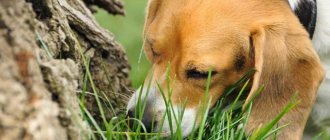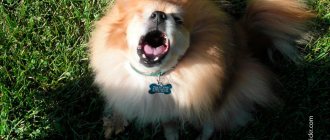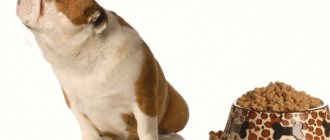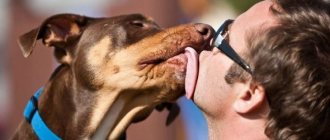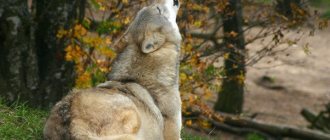Puppies tend to chew everything and in most cases, this is explained by childhood curiosity. Many dogs take great pleasure in chewing sticks or tearing soft toys, sometimes swallowing part of the prey... this is not very good, but it does not cause concern. If a dog eats stones, dirt or sand, any responsible owner has a number of questions: how dangerous is it, why is it happening and how to stop it.
Simple explanations for “complex” behavior?
Any cub explores the outside world in all available ways. If the family has not yet had animals, too much attention is paid to caring for the puppy. In fact, it’s normal for a puppy to play around a little, chew a slipper or tear up a newspaper... he won’t choke on thread or get poisoned by printing ink.
If you notice that your puppy is eating stones on the street, don’t panic! Perhaps the baby simply did not know that the stone was inedible and tried to gain a new experience. Perhaps he will even risk repeating his attempt, that is, swallowing a pebble on the next walk, and again and again... if this behavior is explained by studying the world, there is no reason to worry . Firstly, small pebbles will come out of the puppy’s digestive system naturally, and secondly, you will have a reason to teach your charge the “Fu” command.
The puppy may chew and even swallow stones simply because they have a subtle taste. For example, while walking near a pond, a dog may find a stone with a salty or sweetish touch - this is a new taste and a new experience. In this case, you need to make sure that the taster does not break his teeth; otherwise, believe me, the baby will figure it out on his own.
Note! If eating stones can be called an isolated incident, do not worry, puppies, young and adult dogs are very curious and from time to time they can try out the world around them.
Simple reasons are not always safe! Statistically, most incidents related to eating inedible things are, to one degree or another, related to vitamin deficiency . When a dog’s body lacks vitamins or microelements, it deliberately chews the ground, licks whitewash, chews cement, etc.
In this case, there are reasons for concern, since constantly eating hard objects (stones) can lead to intestinal blockage, and vitamin deficiency itself is scary not because of its presence, but because of its consequences. A puppy eating whitewash and cement strives to replenish the resources of its growing body, but if these signals are ignored, the dog’s teeth are delayed, ears fall off, paws become loose , and this is just the beginning. Without receiving an enhanced and balanced diet, a young dog cannot fully grow and develop, neither physically nor mentally.
The dangers of eating soil
If your four-legged pet is partial to soil and dirt, it is necessary to wean him off this dangerous habit as soon as possible. Otherwise, the following complications may occur:
- Gastrointestinal disorder
. Poisons and toxins settling in urban soil can cause acute vomiting, diarrhea or constipation.
- Dental trauma
. Unlike guinea pigs, dog teeth do not need to be ground down. They change only once in a lifetime and do not grow back. Food that is too hard damages the enamel and creates cracks that can lead to the development of caries.
- Damage to mucous membranes and internal organs
. Sharp stones pose a serious danger to soft tissues and can cause numerous internal bleedings.
- Parasite infestation
. Street dirt not only contains dangerous chemicals and particulates, but also worms.
- Intestinal obstruction
. A small pebble swallowed by a curious puppy will likely come out naturally. You should be concerned when swallowing objects that are too large or several at the same time. In this case, they can block the exit from the intestines, causing toxin poisoning.
- Suffocation
. An object that is too large is dangerous not only by blocking the digestive tract, but also by cutting off oxygen. A choking pet may suffocate.
Stagnation of feces, characteristic of intestinal obstruction, can result in rupture of an overloaded organ. The only way to save an animal is through surgery, so be sure to show it to the doctor at the first sign of discomfort.
Mental disorders
A few decades ago, veterinary medicine did not even consider mental illness in animals. Four-legged animals cannot complain, which means there is no reason for statistics. However, the experience of thousands of owners suggests the opposite; dogs, like people, suffer from emotional distress and mental disorders. Recent studies conducted on small control groups of animals have shown that four-legged animals are more sensitive to emotional pain, although this may not be obvious from the outside.
Who is susceptible to pathology
More often this happens with puppies, not only German Shepherds, aged 2 to 3 months. Males and females are susceptible. Raising a puppy is a difficult process. Whims and illnesses are quite normal, the main thing is to pay attention to the violations in time.
By the way, if the dog is no longer a puppy, a perverted appetite can be a symptom of rabies.
The described violation is less relevant to people who regularly feed their dogs animal food. For example, minced meat purchased from a farm. In this case, the meat is ground directly with the bones of the killed animal, and the dog receives double benefit.
Try to feed your animal food designed to improve bone structure, and provide the diet with vitamins.
Physiological reasons
If you suspect a dog has a mental disorder, you need to contact a veterinarian, who should confirm your concerns. However, such diagnoses are made only when one is confident in overall physical health. Based on evidence on veterinary forums, there are three popular causes for suspected mental illness (two of which we have already discussed):
- Worm infestation - leads to a feeling of pressure in the abdomen, obsessive itching in the anus and intestines.
- Vitamin deficiency is most often a lack of microelements, leading to the consumption of specific inedible “substances”: earth, whitewash, stones that contain cement, etc. With general vitamin deficiency, the dog is simply always hungry, which can be confused with pica. The difference is that with vitamin deficiency, the dog eats a lot and gains fat mass (not muscle), while with a mental disorder, the dog, as a rule, either loses weight or remains in the same shape.
- Dysbacteriosis is a disease accompanied by a number of unpleasant symptoms, from flatulence to complete inability to digest food. Against the background of dysbacteriosis, vitamin deficiency develops and the dog feels constantly hungry, despite adequate feeding. There are many reasons, from purchasing stale or fake food to treatment with aggressive medications and heredity.
Another physiological reason that is difficult to identify without bitter experience is immunodeficiency. In cats, this diagnosis is more common and is viral (that is, quickly transmitted to other, healthy individuals), but absolutely safe for humans. Immunodeficiency in dogs is virtually unknown. It is known that the disease is not dangerous for people, but how quickly it progresses and how much it harms the dog is always a mystery.
Against the background of immunodeficiency, the dog becomes more defenseless against any viral and bacterial agents . The first bell that indicates problems is metabolic disorders that cannot be corrected by traditional methods. Even with adequate feeding, the sick animal develops anemia due to iron deficiency. A dog's natural desire is to eat earth, sand, cameos and anything that has a salty-metallic taste.
What to do if your dog eats soil
The first thing to remember is that physical punishment and yelling are useless and dangerous. If the pet is not familiar with the prohibition commands, then the words “fu” and “no” will be an empty phrase for him.
If the reason for the strange behavior is a lack of attention, then even a rude attitude on the part of the owner will be considered as approval of the committed act.
Depending on the cause of perverted appetite, the problem that has arisen can be solved in three ways: education, treatment, or dietary revision.
Behavior correction and training
The method of distraction and training in prohibition commands will help correct unwanted behavior. The easiest way is to contact a dog trainer, but it is much more effective to achieve the desired result yourself. To do this, follow these recommendations:
- Use sound stimuli. When you notice eating dangerous objects, whistle or clap your hands. Try to remain unnoticed to avoid redirected aggression.
- Buy several chew toys and carry them with you at all times. Try exchanging a pebble you like for a squeaking chicken and be sure to praise your pet if successful. Try to use different toys so as not to lose reciprocal interest on the part of the dog.
- Change walking routes and offer joint games. New activities, playing with a frisbee or jogging together will distract you from extraneous stimuli and strengthen your bond with your pet.
- Learn the "fu" and "don't" commands. It is easiest to train puppies, but with proper persistence, even adult animals can remember the prohibition commands. If your pet spits out or ignores a dangerous object, praise it and give it a treat.
Be sure to keep your dog on a leash while walking. With the help of ammunition it is much easier to stop another attempt to eat something dubious. Remember that an animal can and should be scolded, but only with the help of intonation and only before it approaches you.
An accusing tone during an unwanted behavior and a mandatory reward for stopping the unwanted action will have a much greater effect than senseless screams and frightening hand waving for the dog.
Treatment of psychological or physiological abnormalities
If your puppy constantly eats dirt and stones, ask your veterinarian what to do. Such systematicity is not characteristic of ordinary curiosity, so his behavior is most likely explained by illness or lack of attention. Drug treatment may include the following medications:
- anthelmintics that destroy internal parasites;
- antiviral and immunomodulators necessary to contain the immunodeficiency virus;
- hormonal agents that normalize hormone levels in hypothyroidism;
- antibiotics that fight the causative agent of dysbiosis, and probiotics that restore intestinal microflora.
For psychological problems caused by stress, it is recommended to get rid of the source of anxiety and take sedatives. Try to spend more time with your pet, keeping him active. Agility, a sports discipline based on teamwork between the owner and the pet, gives good results.
How to fight this habit?
Eliminating the problem should begin with a visit to the veterinarian. The doctor will accurately confirm or rule out diseases and make a conclusion about behavioral problems in the animal.
Experts advise to be attentive to your pet’s needs:
- Regular walks.
- Outdoor games.
- A balanced diet, according to age and developmental characteristics.
- Proper treatment and timely prevention of worms.
Every dog needs outdoor play
Diseases and pathological conditions leading to eating stones
In addition to completely understandable and harmless reasons, there are a number of situations where a dog’s consumption of pebbles is associated with some kind of pathology. In this case, it is recommended to urgently undergo examination by a veterinarian.
Avitaminosis
A lack of a particular vitamin or microelement is accompanied by a significant change in the pet’s behavior. Replenishing the deficiency of this substance in the body will help solve the problem. To find out what exactly your pet is missing, you should contact your veterinarian, making sure to tell him about the symptoms that have arisen.
How can I get my dog to stop eating rocks?
Basic obedience training is an important first step to stopping this dangerous behavior. Teaching dogs and puppies two important basic commands: “ugh” and “drop it” is the foundation for successfully breaking this habit.
Using the "drop" command teaches dogs how to safely release rocks from their mouths. The command “fu” first of all strengthens the habit of not eating stones.
When you see your four-legged friend eating, ask him in a calm but firm tone to “give it up.” The same thing happens when you see that they are interested in putting their muzzle near the rocks, just use the "ew" command instead.
If you scream and scare them, it may encourage them to quickly get rid of the stone by swallowing it. Then redirect their attention with a toy or treat as a reward.
Likely consequences
Having figured out why dogs eat soil, we need to talk about what this behavior entails. Such a habit can negatively affect the health of the animal. This is because the dirt may contain hazardous particles or harmful chemicals. If you notice that your pet is gnawing on the soil, stop it immediately.
Those who already know why a dog eats soil on the street should understand that such actions will sooner or later provoke Stones, dirt and other small particles gradually accumulate in its stomach and intestines and, after some time, cause various disorders. In addition, indigestible pieces may become stuck in the digestive tract, in which case you will need to immediately contact a veterinarian.
The habit of gnawing dirt is also harmful to dog teeth. Constant grinding of fangs and incisors leads to damage to the enamel and the formation of cracks. In addition, this process can cause tooth fracture.
What is missing
Seeing a dog eating earth with appetite, the first thing that comes to mind is that the body lacks some elements.
According to scientists, most often animals lack macro- and microelements, in particular calcium and carbon.
An unbalanced diet usually leads to the fact that the four-legged pet begins to compensate for the mineral deficiency on its own: gnawing on walls, eating soil from flower pots and on the street.
If eating soil is a consequence of vitamin deficiency, then consultation with a veterinarian is required. He will help you create a complete diet and recommend effective mineral and vitamin supplements.
When your pet is on a natural diet, the following should be included in the daily menu: apples, meat and bone meal, veal kidneys, beef tripe. It is advisable to place crushed chalk and wood ash next to the food bowl. If the dog likes them, then he is definitely experiencing a deficiency of microelements.
The immunodeficiency that develops against this background is dangerous because the animal loses protection against various viruses and bacteria. This is complicated by a slowdown in metabolism, as a result of which the dog’s body is unable to absorb valuable substances supplied with food.
Anemia may be a concomitant pathology. And with a lack of iron, an unbearable desire to get it appears. Since this element is present in the soil, this is the reason why a dog can eat it so readily.
